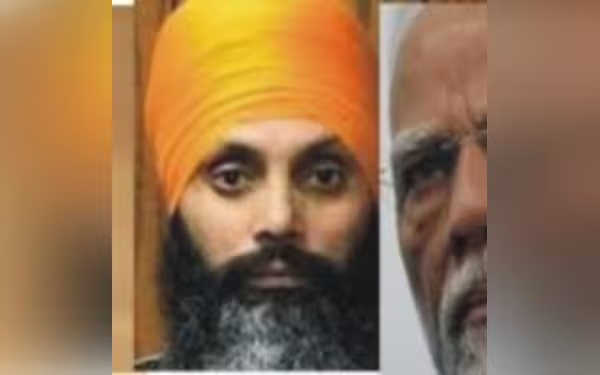Monday, November 25, 2024 05:21 AM
Modi's Alleged Involvement in Nijjar's Assassination Raises International Concerns
- Modi allegedly aware of Nijjar's assassination plot.
- Canadian officials link Indian ministers to violent acts.
- RCMP charges multiple individuals in related incidents.
 Image Credits: pakistantoday
Image Credits: pakistantodayCanadian newspaper alleges Modi's involvement in Nijjar's assassination, raising serious international concerns.
In recent developments, a Canadian newspaper has reported serious allegations regarding the involvement of Indian Prime Minister Narendra Modi in the killing of Sikh activist Hardeep Singh Nijjar. This incident, which took place in British Columbia, has raised significant concerns about the extent of foreign interference and violence against individuals advocating for Sikh rights. The report from The Globe and Mail indicates that Canadian security agencies believe Modi was not only aware of Nijjar's assassination but also of other violent plots orchestrated by Indian officials.
The report cites an unnamed Canadian national security official who claims that the plot to eliminate Nijjar was directed by Indian Home Minister Amit Shah. It is alleged that Modi, along with Indian External Affairs Minister S. Jaishankar and National Security Adviser Ajit Doval, were informed about the operation prior to its execution. This revelation marks a critical moment, as it is the first time such high-ranking officials have been implicated in discussions surrounding the targeted killing of Nijjar.
The official emphasized the improbability that three senior political figures in India—Modi, Jaishankar, and Doval—were unaware of the discussions regarding Nijjar's assassination. The official stated, "It would be unthinkable that three senior political figures in India were not aware and involved in discussions about the targeted killing before it proceeded." This statement underscores the gravity of the situation and the potential implications for international relations.
Nijjar was killed last year as he was leaving a gurdwara in Surrey, British Columbia. Canadian intelligence agencies believe that this assassination is part of a broader campaign orchestrated by Amit Shah. Reports suggest that both U.S. and Canadian intelligence agencies have linked Shah to the planning of this violent act. Furthermore, Royal Canadian Mounted Police (RCMP) Commissioner Mike Duheme revealed that there is evidence indicating India's involvement not only in Nijjar's killing but also in the murders of three other individuals.
As investigations continue, the RCMP has charged eight individuals with murder and another 22 with extortion related to these incidents. Additionally, the force has issued warnings that 13 other individuals are considered to be in "imminent danger." The RCMP has expressed concerns that "the scale of India’s activities could not be stopped solely by law enforcement," highlighting the need for a more comprehensive approach to address such serious allegations.
This situation raises important questions about the safety of individuals advocating for their rights and the lengths to which foreign governments may go to silence dissent. As the world watches, it is crucial for Canada and other nations to uphold the principles of justice and human rights, ensuring that such acts of violence are thoroughly investigated and addressed. The implications of these findings could have far-reaching effects on diplomatic relations and the global fight for human rights.













